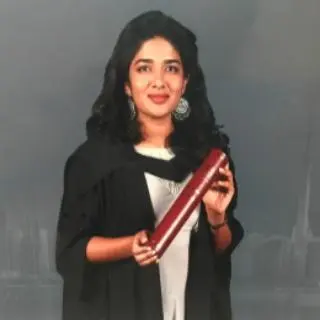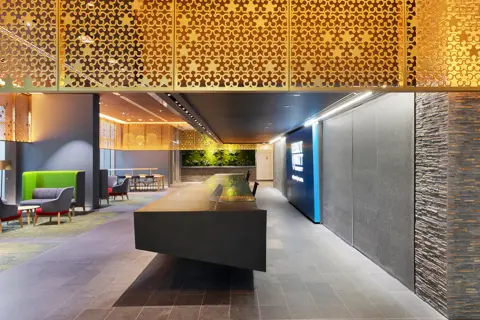Key information
- Level
- Undergraduate
- Delivery type
- Full Time
- Degree qualification
- BA (Hons)
- Mode of delivery
- On-Campus
- Duration
- 4 years
- Location
- Dubai
- Start date
- September
The BA (Hons) Architecture programme at the Heriot-Watt University Dubai Campus was launched in 2015. Since then, the programme has rapidly grown to a community of more than 100 students, creating a unique niche within the vibrant design community of Dubai and the UAE. Strategically placed within the School of Energy, Geoscience, Infrastructure and Society (EGIS), the programme draws expertise from multiple disciplines associated with the built environment.
The programme aims to educate students in addressing current challenges faced worldwide, including climate change, resource depletion, sustainability and energy efficiency. Students will work on authoring projects to create a positive impact through diverse design practices and innovative solutions that resonate with the industry during their undergraduate studies.
Graduates from the B.A Architecture(Hons) programme will be:
- Creative Critical Thinkers with a research-informed, process-driven design enabling adaptability and innovative architecture.
- Advocates of Contextually Driven Architecture, contributing towards building a regionally and culturally sustainable future.
- Adept with Contemporary Challenges and Advanced Technologies, keeping them current and design forward.
- Confident in the subject area and embrace a Collaborative and Multi-disciplinary Design Approach.
- Industry linked, including national and international practitioners and relevant professional bodies.
Why study Architecture at Heriot-Watt University's Dubai Campus?
- The BA (Hons) Architecture programme is accredited by the Royal Institute of British Architects (RIBA). The programme is the first and only four-year RIBA – Part One undergraduate programme in the UAE. RIBA has commended our programme for programme leadership and engagement.
- RIBA Part One accreditation gives Heriot-Watt University, Dubai students the opportunity to join RIBA Part Two Masters programmes in the UK and internationally.
- Heriot-Watt University has a wealth of specialist expertise in the built environment and is internationally recognized as one of only four Centres of excellence in sustainable building design.
- The course covers both technical and theoretical aspects, providing an excellent foundation for future practice or study at the postgraduate level.
- The combination of lectures and studio delivery encourages excellent self-motivation and the development of transferable skills that are valuable across the built environment industry.
- Our programme is designed to help shape the built environment for the 21st century, not only in terms of architecture but also to support a sustainable, energy-efficient and green society.
- Excellent linkup with regional and international architecture practice.
- Excellent facilities at our new digital campus, with dedicated design studios for each cohort of the architecture programme.
Your student experience
We have research-active faculty leading the programme. Ongoing research themes include the phenomenological experience of space, redefining public spaces and social infrastructure, intelligent facades and net-zero buildings, and smart and sustainable cities. The research themes are integrated into the curriculum through core design studios and architecture dissertations. Some of the key programme research initiatives are:
- Architectural Dissertation: The dissertation module introduced in the fourth year of the undergraduate programme encourages students to develop and position their research interest in architecture through research and academic writing.
- ORA House: In 2018, a multi-disciplinary team of staff and students from Heriot-Watt University participated in the first-ever Solar Decathlon Middle East (SDME) competition organized by the Dubai Electricity and Water Authority (DEWA) in partnership with the US Department of Energy. The house received commendations for innovation in 'Architecture' and 'Engineering and Construction' and did well in the 'Sustainability' contest. Upon the success of the ORA house, Heriot Watt's Team ESTEEM recently participated in the second SDME contest held in 2021. Read more about the contest and ORA House.
- Centre of Excellence in Smart Construction: Our architecture programme is part of the Heriot-Watt University's Centre of Excellence in Smart Construction (CESC). CESC is a global hub for innovation, industry-led research and solutions development. Students have a great opportunity to connect with current research and industry partners through CESC's frequent conferences and panel discussions. Read more about CESC and its initiatives.
Meet the Faculty
Go Global
There are currently no Go Global opportunities for this particular programme. However, other Go Global opportunities may be available. Please contact studywithus@hw.ac.uk for more information.
Course content
September Intake - Dubai
Year 1
Students studying for the BA (Hons) course are introduced to foundational knowledge and skills that influence the production of architecture. Initial short design projects in the first year introduce students to drawing and making projects. A suite of lectures and workshops introduces critical thinking in key subject areas such as Construction Technology, Shaping Tomorrow Together and History of the Built Environment. These enrich students' knowledge of architecture and help them conceptualize space and realize design proposals using drawings and models. Students undertake the conceptional design development using the medium of fine arts in their first semester. In the second semester, small-scale architectonic explorations in residential architecture are explored. In addition to the core design studio, students are introduced to courses in Histories and Theory, Construction and Environment.
Mandatory September
- Construction Technology: Small Scale Buildings
- Shaping Tomorrow Together A
- Architectural Design Studio 1
Mandatory January
- Shaping Tomorrow Together B
- Architectural Design Studio 2
- History of the Built Environment
Year 2
Year two builds on the foundational knowledge of design and architectural vocabulary introduced in the first year. Critical thinking, reasoning, research-informed design, structures and materials are themes explored within the development process in the design studio. Students are introduced to digital packages as design and representation tools. Extensive digital prototyping is used for design exploration and to understand the relationship between digital and analogue processes. Taught courses expand knowledge in Construction and Histories and Theories, Environmental studies, and Building Services Technology.
Mandatory September
- Construction Technology: Structure and Fabric
- Architectural Representation
- Architectural Design Studio 3
Mandatory January
- Architectural Design Studio 4
- History and Theories of Architecture
Optional January
- Environment and Behaviour
- Building Services Technology
Year 3
Year Three advances knowledge, critical thinking and design skills working in various complex local-regional urban and social settings. Core design projects consist of medium-scale public buildings and design intervention within the public realm. The design projects undertaken have the urban and landscape context that ranges from the dense traditional neighbourhoods to the more contemporary fragmented parts of the city. Taught courses in Histories and Theories, Energy and Environment, and Professional Practice further bridge between theory and practice in the design studio. Students will participate in a Collaborative Design Project with Architectural Engineers and Civil Engineers where they work in multi-disciplinary teams.
Mandatory September
- Archaeology of Ideas
- Architectural Design Studio 5
- Integrated Technology 1
Mandatory January
- Energy and Buildings
- Architectural Design Studio 6
- Critical Building Analysis
Year 4
Year 4 is designed to consolidate the previous three years of learning with complex and critical challenges in design, technology, and writing. The year also aids students' transitions into the industry. Students complete a capstone design project where they develop a detailed and rigorous design project linked over two semesters allowing the student to develop a comprehensive body of work that can meet RIBA Criteria and the RIBA Graduate Attributes for Part One. In developing these projects, students are required to conceive in parallel and integrate technology in their design, demonstrating their knowledge of environmental design, structural innovation, constructional and material choices, and legislative requirements. Students in Year 4 also develop a History and Theory-based dissertation, take a course in Innovation in Construction Practice.
Mandatory September
- Dissertation (Architecture)
- Architectural Design Studio 7
- Professional Practice
Mandatory January
- Innovation in Construction Practice
- Architectural Design Studio 8
- Integrated Technology 2
Disclaimer
The courses mentioned above may change between now and the time that you study. For more information, please view our Terms and Conditions.
Programme Video
Student testimonials
Being a graduate of Heriot Watt University has laid down the framework to further my career aspirations and given me the opportunity to study at postgraduate level to achieve RIBA Part 2.
Fees and funding
| Status | Full Time |
|---|---|
| Fee | AED 88,920 |
- All tuition fees inclusive of VAT.
Additional information
To know about the fees for this programme, please send an email to dubaienquiries@hw.ac.uk
Entry requirements
We have standard entry requirements for all of our courses that you will have to meet.
Year 1
Our entry criteria are listed below. However, please note that the final decision remains at the discretion of the course director after evaluating scores of individual relevant subjects.
- GCE A-Level - CCC (or AABB at AS-Level)
- CBSE/Other Indian Boards - 65%.
- American High School Diploma/SABIS - 70% + SAT I - 1000 (500 English and 500 Math)
- Tawjihiyya - 80% or Elite/Advance - 75%
- International Baccalaureate Diploma Programme - 24 points (3 HL and 3 SL).
- BTEC Level 3 Ext Diploma - MMM
- FBISE grade 12 or equivalent – 70%
- Russian/Kazakhstan (Attestat) - Grades of 5 in every subject + IELTS 6.0
- French Baccalaureate - 13/20 + IELTS 6.0
- Lebanese High School Diploma - 80% + SAT I – 1000 (500 English + 500 Math) or Lebanese Baccalauréat 13/20 + IELTS 6.0
- Foundation year Successful completion of Heriot-Watt University Degree Entry Programme (Engineering/Design) with a CCCC.
- Compulsory subjects to include English.
We also welcome Year 2 and Year 3 students from other universities with architectural educational qualifications, provided they meet our evaluation process.
To find out more about the specific entry requirements for your country, please refer to our International Entry Requirements.
To find out about the entry requirements for this programme, please send an email to dubaienquiries@hw.ac.uk
English language requirements
As our degrees are taught and assessed in English, applicants must be able to prove their level of English language ability.
The minimum English language requirement for entry to this programme is IELTS 6.0 (or equivalent) with no score lower than 5.5.
Please see our detailed English language requirements.
Why Heriot-Watt
As the first British university to set up a campus in Dubai in 2005, we have established ourselves as a pioneer in the higher education market in the UAE. The three consecutive five-star ratings by the Knowledge and Human Development Authority (KHDA) is a testament to our reputation for world-class teaching.
The futuristic Dubai campus is designed to offer interactive and collaborative learning experiences with innovative classroom styles fostering group work and engagement like Collaborative lecture theatres, Digitally Classrooms and Seminar rooms. The campus also has dedicated cutting-edge laboratories and workshops that span various engineering disciplines along with Psychology, IT, Photography, Design and Architecture.
Our practical, leading-edge research combined with strong links to business and industry, have made our graduates highly employable and sought after by the best organisations worldwide, with over 90% in graduate-level jobs or further study within six months of graduation. On top of that, we have beautiful campuses, across the globe, so you'll get a truly international education through our Go Global programme.
Employability
Graduates from the Architecture BA(Hons) programme can expect to find jobs as architectural assistants in multinational architecture and engineering companies, government organisations and small to medium-sized private sector firms (architecture, urban design and interior design). The BA (Hons) Architecture degree offered by Heriot-Watt provides an excellent first step in an architectural education that can lead towards becoming a professionally qualified Architect with further studies, examinations and experience. *Students who wish to join the UK Register of architects (a pre-requisite of becoming a Chartered Architect in the UK with the RIBA) should consult the Architects Registration Board’s website for further information about its routes to registration.
Potential career paths
- architectural assistants in multinational architecture and engineering companies, government organisations and small to medium-sized private sector firms (architecture, urban design and interior design).
Student life
Explore facilities, and chat to staff and students






